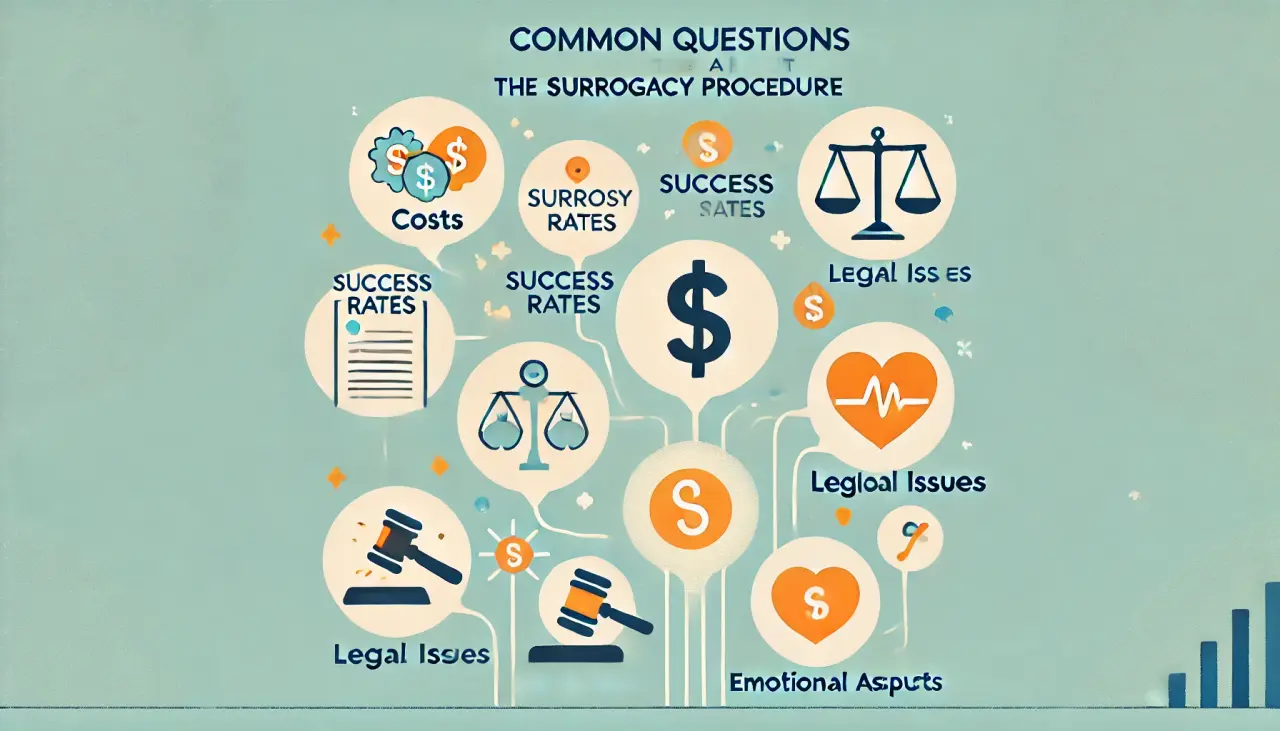
What is Surrogacy? A Detailed Guide to the Surrogacy Process and Its Types
Surrogacy is a growing option for many individuals and couples facing challenges with natural conception. Whether due to medical, biological, or social reasons, surrogacy allows people to realize their dreams of becoming parents. But what is surrogacy, and how does it work? Let’s explore the types, processes, and the key aspects of surrogacy in detail.
Surrogacy Definition
Surrogacy is an assisted reproductive technique where a surrogate (also called a gestational carrier) agrees to carry and give birth to a child on behalf of someone else. This method is often chosen by people who cannot conceive naturally due to various reasons such as infertility, health issues, or personal circumstances.
Surrogacy is categorized into two main types: traditional surrogacy and gestational surrogacy.
Types of Surrogacy
| Type | Description | Genetic Link | Popularity |
|---|---|---|---|
| Traditional Surrogacy | The surrogate mother’s egg is fertilized by sperm from the intended father or a donor, making the surrogate genetically related to the child. | Yes | Less popular due to legal and emotional complexities. |
| Gestational Surrogacy | The surrogate carries an embryo created via IVF from the intended parents or donors, with no genetic link to the child. | No | More popular due to legal simplicity and reduced emotional complications. |
Why Choose Surrogacy?
Surrogacy can be an important choice for several groups of people, each benefiting in different ways:
- Helps infertile couples become parents.
- Supports LGBTQ+ families.
- Enables single individuals to become parents.
- Assists individuals with medical conditions.

Understanding the Surrogacy Process
As previously discussed, surrogacy involves many steps and processes. Here we’ll take a more in-depth look at gestational surrogacy; traditional forms may no longer be accepted or recognized as easily.
Step 1: Confirming the Desire for Surrogacy
Surrogacy as a way of having genetically related children can be a life-altering decision, so the first step should be for intended parents to clearly confirm their willingness to pursue surrogacy. This decision also means taking on many responsibilities now which you might not even anticipate at this point.
Step 2: Finding and Selecting a Surrogate
- Independent Search: Intended parents can seek a surrogate on their own through various online platforms or personal referrals, saving both money and effort by conducting their search independently.
- Surrogacy Agency: Many intended parents prefer working with a surrogacy agency for various services they offer, including matching with qualified surrogates and offering legal and emotional support throughout the process. Agencies conduct thorough screenings to ensure each surrogate is physically and psychologically suitable to undertake this journey.
Step 3: Legal Agreements and Contracts
Legal agreements are an essential component of the surrogacy process and ensure all rights and responsibilities of all parties involved are clearly established and protected. Contracts cover various aspects, such as parental rights, compensation, and medical and psychological care.
Step 4: Medical Procedures and Embryo Transfer
As soon as legal agreements have been finalized, medical procedures related to surrogacy begin. This includes ovarian stimulation, egg retrieval, and embryo transfer.
Step 5: Pregnancy and Monitoring
Once a surrogate has confirmed her pregnancy, regular monitoring and medical check-ups must be undertaken to protect both mother and baby’s wellbeing.
Step 6: Preparing for the Birth
As the due date nears, preparations for the birth will enter its final phase. This includes drawing up the birth plan, legal preparations, and logistical arrangements.
Step 7: Establish and Transfer of Parental Rights
Surrogacy culminates with the birth of a child. Once this occurs, legal documentation will be completed to transfer parental rights to intended parents, and surrogates will receive postpartum care following birth.

The Legal and Ethical Considerations of Surrogacy
Surrogacy offers hope to families or individuals unable to conceive; however, its legal and ethical ramifications vary considerably across nations and regions.
Surrogacy laws differ depending on your location. Each region’s approach can range from full acceptance and regulation, to outright prohibition; its influence being determined by cultural, religious and ethical considerations in their area.
| Country | Legal Status | Details |
|---|---|---|
| United States | Varies by state | Diverse regulations; states like California are very supportive. |
| Ukraine | Fully Legal | Commercial surrogacy is legal with clear parental rights. |
| Russia | Fully Legal | Permissive laws, though regulation lacks robustness. |
| Kyrgyzstan | Legally Permitted | Emerging market; legal but less regulated, increasing risks. |
| Canada | Altruistic Only | Commercial surrogacy is banned, but altruistic surrogacy is allowed and well-regulated. |
| India | Banned | Once a hub for surrogacy, now banned both for residents and foreigners. |
| Australia | Altruistic Only | Commercial surrogacy is illegal; only altruistic surrogacy is permitted across states. |
This table provides a quick overview of the legal status of surrogacy in various countries, highlighting the diverse approaches and regulations worldwide.

Common Questions About the Surrogacy Procedure
Surrogacy has become an increasingly popular option for expanding families, but the process can be complex and intimidating. Below are some frequently asked questions and answers about surrogacy.
1. How much does surrogacy cost?
Surrogacy can be quite costly, with costs depending on factors like location, type of surrogacy, and specific circumstances surrounding intended parents and surrogates. In the US, surrogacy typically ranges between $100,000-$150,000 total cost – this includes agency fees, legal costs, and compensation to surrogate(s), medical expenses and related costs; in countries that permit commercial surrogacy such as Ukraine or Georgia costs are significantly lower, usually around $50,000 to $80,000 total cost.
2. What is the success rate of surrogacy?
Success rates of surrogacy depend on multiple factors, including the age and health of the egg donor(s), quality of embryos, surrogate health issues, as well as age/health of intended mother’s eggs if used, quality of embryos produced, health concerns of intended parents etc. On average, gestational surrogacy using donor eggs typically sees 60-70% success rates; using intended mother’s own eggs might produce lower rates.
3. How long does the surrogacy process take?
Surrogacy timelines can differ, but typically take about 15-18 months from start to finish. This includes finding and matching with a surrogate, completing legal processes, IVF treatment cycle, pregnancy, and birth.
4. What are the legal aspects of surrogacy?
Surrogacy laws vary based on your region and country. In the US, regulations vary widely by state. It’s essential to work with an experienced surrogacy law attorney to make sure everyone’s rights are upheld.
5. What kind of relationship can we expect with the surrogate?
Relationships between intended parents and surrogates depend upon both parties’ preferences. While some intended parents maintain close and ongoing ties with their surrogate, maintaining regular communication and visits throughout pregnancy as well as after giving birth, others may opt for more formal relationships where communication through an agency takes place.
6. Are there any risks associated with surrogacy?
As with any medical procedure, surrogacy involves certain risks for both surrogates and intended parents. Surrogate pregnancy risks are similar to any pregnancy complication during gestation or childbirth; intended parents face legal and emotional risks related to surrogate changing her mind or complications in IVF process.

Conclusion: Making Informed Decisions About Surrogacy
Understanding Surrogacy
Surrogacy offers hope to those unable to conceive naturally, through gestational surrogacy. This process involves having a surrogate mother carry a child for their intended parents; gestational surrogacy being more popular due to having no genetic connection to either party making legal and emotional aspects easier to navigate.
Choosing Surrogacy
No matter if you are considering becoming a surrogate or intended parent, choosing surrogacy is an important decision that requires taking many factors into consideration, including emotional, legal, and financial factors. Understanding all types of surrogacy allows for optimal selection that best fits with your situation.
Legal Framework
Legal requirements surrounding surrogacy vary significantly across regions, which can influence a surrogacy experience. The United States offers complex regulations varying depending on state. By contrast, Ukraine and Russia typically offer more straightforward regulations that support commercial surrogacy arrangements.
Ethical Considerations
Surrogacy raises many important ethical considerations, including potential exploitation of surrogates, rights of surrogates, and child welfare concerns. All parties involved should be fully informed and supported throughout this journey.
Before You Decide
Before making a decision about surrogacy, it’s essential to carefully consider your motivations, research the process, and seek professional guidance. Surrogacy journeys can vary dramatically; what works for one may not for another. By making an informed and confident decision you can ensure the best possible outcomes for both yourself and all other involved in the surrogacy process.